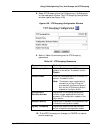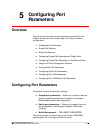
Cajun P550/P880/P882 Switch User Guide
Configuring Port Parameters
5-5
Flow control is not applied across the switch itself. Therefore, if you
have a server sending data on one port at 100MB and a client
receiving the data at 10MB, the switch will not throttle the data at
the Server’s input based on outgoing buffer backup on the client’s
port in this default queuing mode.
Switch Port Features
The P550/P880/P882 switches all support up to 1024 VLANs and
also supports multiple forwarding databases. This means that each
VLAN is associated with its own Address Forwarding Table (AFT).
Therefore, identical MAC addresses can simultaneously exist on
multiple VLANs. The P550/P880/P882 switches have many
parameters for configuring VLAN/port associations.
This section provides the following:
■ Creating Virtual LANs (VLANs)
■ VLAN Operational Rules
■ Relationship Between Different Switch Port Parameters
■ Assigning VLANs to a Port and Associated Issues
Creating Virtual LANs (VLANs)
A VLAN is a logical network that consists of one or more ports from
one or more switches that are logically grouped together. The
advantage of using VLANs is threefold:
■ Broadcast and multicast containment
■ Increased network bandwidth
■ Logical workgroups can share network resources
You can create VLANs manually and automatically on the P550/
P880/P882 switch.
Manual VLAN
Creation
The manual creation of VLANs is done through the ‘Virtual LANs’
menu selection. When a VLAN is created manually, the user assigns
a VLAN name and VLAN ID to each VLAN that is created. VLAN
names and VLAN Ids must be unique for each VLAN created within
a P550/P880. To make ports on more than one device participate in
a particular VLAN, you must use the same VLAN ID to identify the
VLAN on every device.


















